| Listing 1 - 10 of 16 | << page >> |
Sort by
|
Book
ISBN: 8774925776 9788774925774 Year: 1986 Volume: 3 Publisher: Odense: Odense University press,
Abstract | Keywords | Export | Availability | Bookmark
 Loading...
Loading...Choose an application
- Reference Manager
- EndNote
- RefWorks (Direct export to RefWorks)
Famous Persons. --- Mental Disorders --- Famous Person --- Person, Famous --- Persons, Famous --- history. --- Famous Persons --- history
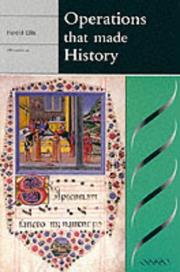
ISBN: 0511043449 9780511043444 0585220662 9780585220666 1900151154 Year: 1996 Publisher: [Place of publication not identified] Greenwich Medical Media
Abstract | Keywords | Export | Availability | Bookmark
 Loading...
Loading...Choose an application
- Reference Manager
- EndNote
- RefWorks (Direct export to RefWorks)
Surgery --- Surgery, Operative --- General Surgery --- Famous Persons. --- Surgical Procedures, Operative --- Famous Person --- Persons, Famous --- Operative surgery --- Surgical techniques --- History --- history. --- methods. --- Technique --- History.
Book
ISBN: 9789044131192 Year: 2014 Volume: 2 Publisher: Antwerpen : Garant,
Abstract | Keywords | Export | Availability | Bookmark
 Loading...
Loading...Choose an application
- Reference Manager
- EndNote
- RefWorks (Direct export to RefWorks)
History of human medicine --- Physicians --- Famous Persons. --- Famous Person --- Person, Famous --- Persons, Famous --- Medicine, History --- History of Medicine. --- Medicine --- history --- Hygiene. Public health. Protection --- History Medicines --- Medicine Histories --- Medicines, History --- Biography --- History --- History of Medicine --- Famous Persons
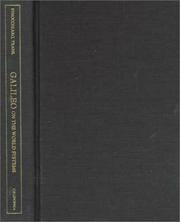
ISBN: 1282355015 9786612355011 0520918223 058505519X 9780520918221 9780585055190 0520205480 0520206460 Year: 1997 Publisher: Berkeley (Calif.) : University of California press,
Abstract | Keywords | Export | Availability | Bookmark
 Loading...
Loading...Choose an application
- Reference Manager
- EndNote
- RefWorks (Direct export to RefWorks)
Galileo's 1632 book, Dialogue on the Two Chief World Systems, Ptolemaic and Copernican, comes alive for twentieth-century readers thanks to Maurice Finocchiaro's brilliant new translation and presentation. Condemned by the Inquisition for its heretical proposition that the earth revolves around the sun, Galileo's masterpiece takes the form of a debate, divided into four "days," among three highly articulate gentlemen. Finocchiaro sets the stage with his introduction, which not only provides the human and historical framework for the Dialogue but also admits the reader gracefully into the basic non-Copernican understanding of the universe that would have been shared by Galileo's original audience. The translation of the Dialogue is abridged in order to highlight its essential content, and Finocchiaro gives titles to the various parts of the debate as a guide to the principal topics. By explicating his own critical reading of this text that is itself an exercise in critical reasoning on a gripping real-life controversy, he illuminates those universal, perennial activities of the human mind that make Galileo's book a living document. This is a concrete, hands-on introduction to critical thinking. The translation has been made from the Italian text provided in volume 7 of the Critical National Edition of Galileo's complete works edited by Antonio Favaro. The translator has also consulted the 1632 edition, as well as the other previous English translations, including California's 1967 version.Galileo on the World Systems is a remarkably nuanced interpretation of a classic work and will give readers the tools to understand and evaluate for themselves one of the most influential scientific books in Western civilization.
Astronomy --- Galilei, Galileo, --- Solar system --- Early works to 1800. --- Galilei, Galileo --- Early works to 1800 --- ancient world. --- astronomer. --- astronomy. --- biographical. --- copernican. --- copernicus. --- critical thinking. --- cultural context. --- famous person. --- hands on. --- historical context. --- italian history. --- italy. --- literary analysis. --- literary criticism. --- literary studies. --- outer space. --- philosopher. --- philosophy. --- planets. --- ptolemaic. --- ptolemy. --- scientific. --- solar system. --- translation. --- universe. --- western world. --- world history. --- world systems.
Book
ISBN: 022617154X 9780226171548 9780226171371 9780226171401 022617137X Year: 2014 Publisher: Chicago: University of Chicago press,
Abstract | Keywords | Export | Availability | Bookmark
 Loading...
Loading...Choose an application
- Reference Manager
- EndNote
- RefWorks (Direct export to RefWorks)
George Herbert Mead is a foundational figure in sociology, best known for his book Mind, Self, and Society, which was put together after his death from course notes taken by stenographers and students and from unpublished manuscripts. Mead, however, never taught a course primarily housed in a sociology department, and he wrote about a wide variety of topics far outside of the concerns for which he is predominantly remembered-including experimental and comparative psychology, the history of science, and relativity theory. In short, he is known in a discipline in which he did not teach for a book he did not write. In Becoming Mead, Daniel R. Huebner traces the ways in which knowledge has been produced by and about the famed American philosopher. Instead of treating Mead's problematic reputation as a separate topic of study from his intellectual biography, Huebner considers both biography and reputation as social processes of knowledge production. He uses Mead as a case study and provides fresh new answers to critical questions in the social sciences, such as how authors come to be considered canonical in particular disciplines, how academics understand and use others' works in their research, and how claims to authority and knowledge are made in scholarship. Becoming Mead provides a novel take on the history of sociology, placing it in critical dialogue with cultural sociology and the sociology of knowledge and intellectuals.
Sociology --- Methodology. --- Mead, George Herbert, --- Mead, G. H. --- Sociology - Methodology --- academic, learning, scholarly, research, college, university, sociology, psychology, psychologist, posthumous, experimental, comparative, science, relativity, scientific, disciplines, interdisciplinary, knowledge, philosophy, philosopher, reputation, controversial, intellectual, thinker, famous person, case study, social studies, academics, critical, laboratory, methodology, classroom, student.
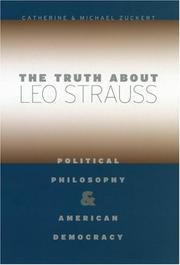
ISBN: 1281966916 9786611966911 0226993345 9780226993348 9780226993324 0226993337 0226993329 9780226993331 9781281966919 6611966919 Year: 2006 Publisher: Chicago University of Chicago Press
Abstract | Keywords | Export | Availability | Bookmark
 Loading...
Loading...Choose an application
- Reference Manager
- EndNote
- RefWorks (Direct export to RefWorks)
Is Leo Strauss truly an intellectual forebear of neoconservatism and a powerful force in shaping Bush administration foreign policy? The Truth about Leo Strauss puts this question to rest, revealing for the first time how the popular media came to perpetuate such an oversimplified view of such a complex and wide-ranging philosopher. More important, it corrects our perception of Strauss, providing the best general introduction available to the political thought of this misunderstood figure. Catherine and Michael Zuckert-both former students of Strauss-guide readers
Political science --- Philosophy. --- History. --- Strauss, Leo. --- famous person, history, historical, well known, philosopher, philosophy, politics, political, america, american, democracy, government, poli sci, neoconservatism, conservative, bush, administration, foreign policy, media, misunderstood, myth, analysis, explanation, ancient, modern, nihilism, relativism, strength, weakness, heidegger, nietzsche, contemporary, crisis, postmodern, republic.
Book
ISBN: 022625738X Year: 2015 Publisher: Chicago, [Illinois] ; London, [England] : The University of Chicago Press,
Abstract | Keywords | Export | Availability | Bookmark
 Loading...
Loading...Choose an application
- Reference Manager
- EndNote
- RefWorks (Direct export to RefWorks)
Runaway slave Sojourner Truth gained fame in the nineteenth century as an abolitionist, feminist, and orator and earned a living partly by selling photographic carte de visite portraits of herself at lectures and by mail. Cartes de visite, similar in format to calling cards, were relatively inexpensive collectibles that quickly became a new mode of mass communication. Despite being illiterate, Truth copyrighted her photographs in her name and added the caption “I Sell the Shadow to Support the Substance. Sojourner Truth.” Featuring the largest collection of Truth’s photographs ever published, Enduring Truths is the first book to explore how she used her image, the press, the postal service, and copyright laws to support her activism and herself. Darcy Grimaldo Grigsby establishes a range of important contexts for Truth’s portraits, including the strategic role of photography and copyright for an illiterate former slave; the shared politics of Truth’s cartes de visite and federal banknotes, which were both created to fund the Union cause; and the ways that photochemical limitations complicated the portrayal of different skin tones. Insightful and powerful, Enduring Truths shows how Truth made her photographic portrait worth money in order to end slavery—and also became the strategic author of her public self.
African American women abolitionists --- African American women abolitionists --- Truth, Sojourner, --- Truth, Sojourner, --- sojourner truth, famous person, women, black experience, 1800s, 19th century, contemporary, history, historical, abolition, abolitionist, feminist, feminism, womanhood, orator, speeches, lectures, speaker, public speaking, photos, photographs, illustrated, postal service, copyright, legal issues, social studies, race, racism, slavery, wartime, postwar, communication, aint i a woman, portrait, photography.
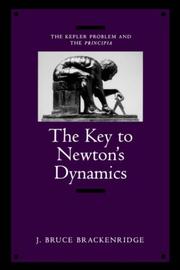
ISBN: 1282355007 9786612355004 0520916859 0585375828 9780520916852 0520200659 9780520200654 0520202171 9780520202177 Year: 1995 Publisher: Berkeley (Calif.) : University of California press,
Abstract | Keywords | Export | Availability | Bookmark
 Loading...
Loading...Choose an application
- Reference Manager
- EndNote
- RefWorks (Direct export to RefWorks)
While much has been written on the ramifications of Newton's dynamics, until now the details of Newton's solution were available only to the physics expert. The Key to Newton's Dynamics clearly explains the surprisingly simple analytical structure that underlies the determination of the force necessary to maintain ideal planetary motion. J. Bruce Brackenridge sets the problem in historical and conceptual perspective, showing the physicist's debt to the works of both Descartes and Galileo. He tracks Newton's work on the Kepler problem from its early stages at Cambridge before 1669, through the revival of his interest ten years later, to its fruition in the first three sections of the first edition of the Principia.
Kepler's laws. --- Celestial mechanics. --- Gravitational astronomy --- Mechanics, Celestial --- Kepler laws --- Kepler's laws of planetary motion --- Planetary motion, Kepler's laws of --- Astrophysics --- Mechanics --- Planetary theory --- Planets --- Orbits --- Celestial mechanics --- Kepler's laws --- Astronomy --- Newton, Isaac --- 1600s. --- academic. --- analysis. --- biographical. --- cambridge. --- centrifugal force. --- conservation of motion. --- cultural context. --- curvature. --- descartes. --- famous person. --- famous scientist. --- galileo. --- historical. --- history buff. --- kepler problem. --- laws of motion. --- mathematics. --- newton. --- newtons dynamics. --- outer space. --- physics. --- planetary motion. --- planets. --- principia. --- scholarly. --- scientific. --- scientist. --- true story.
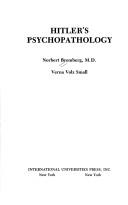
ISBN: 0823623459 Year: 1983 Publisher: New York (N.Y.): International universities press
Abstract | Keywords | Export | Availability | Bookmark
 Loading...
Loading...Choose an application
- Reference Manager
- EndNote
- RefWorks (Direct export to RefWorks)
Famous Persons. --- Mental Disorders --- Famous Person --- Person, Famous --- Persons, Famous --- history. --- Hitler, Adolf --- -Hitler, Adolf --- -Mental health --- Psychology --- Psychoanalyse --- Mental disorders --- Famous persons --- HITLER --- MENTAL DISORDERS --- cultuur en religie --- History. --- ADOLF, 1889-1945 --- history --- Famous persons. --- cultuur en religie. --- ADOLF, 1889-1945. --- Hitler --- Adolf, 1889-1945. --- Cultuur en religie. --- Famous Persons --- Hitler, Adolf, --- Mental health. --- Psychology. --- Gitler, Adolʹf, --- Hsi-tʻe-le, --- Hitlar, ʼAdolf, --- Chitler, Adolphos, --- Hitler, Adolph, --- Khitler, Adolf, --- Hitlerus, Adolfus, --- Hiṭlar, Aṭālpu, --- היטלר --- היטלר, אדולף,
Book
ISBN: 9780226040028 9780226040165 022604016X 022604002X Year: 2013 Publisher: Chicago, Ill. The University of Chicago Press
Abstract | Keywords | Export | Availability | Bookmark
 Loading...
Loading...Choose an application
- Reference Manager
- EndNote
- RefWorks (Direct export to RefWorks)
Despite its foundational role in the history of philosophy, Plato's famous argument that art does not have access to truth or knowledge is now rarely examined, in part because recent philosophers have assumed that Plato's challenge was resolved long ago. In Art and Truth after Plato, Tom Rockmore argues that Plato has in fact never been satisfactorily answered-and to demonstrate that, he offers a comprehensive account of Plato's influence through nearly the whole history of Western aesthetics. Rockmore offers a cogent reading of the post-Platonic aesthetic tradition as a series of responses to Plato's position, examining a stunning diversity of thinkers and ideas. He visits Aristotle's Poetics, the medieval Christians, Kant's Critique of Judgment, Hegel's phenomenology, Marxism, social realism, Heidegger, and many other works and thinkers, ending with a powerful synthesis that lands on four central aesthetic arguments that philosophers have debated. More than a mere history of aesthetics, Art and Truth after Plato presents a fresh look at an ancient question, bringing it into contemporary relief.
Philosophy --- Aesthetics of art --- Aesthetics --- Art --- Imitation in art --- Mimesis in art --- Truthfulness and falsehood in art --- Pictures --- Appropriation (Art) --- Beautiful, The --- Beauty --- Art and philosophy --- Esthetics --- Taste (Aesthetics) --- Criticism --- Literature --- Proportion --- Symmetry --- Reproduction --- Copying --- Analysis, interpretation, appreciation --- Psychology --- Mimesis in art. --- Imitation in art. --- Truthfulness and falsehood in art. --- Aesthetics. --- Philosophy. --- Radio broadcasting Aesthetics --- philosophy, philosopher, famous person, well known, ancient, history, historical, argument, knowledge, artistic, answer, question, aesthetics, western, academic, scholarly, research, platonic, diverse, thinker, intellect, aristotle, poetics, medieval, christian, kant, critique, judgment, hegel, phenomenology, marxism, social realism, heidegger, falsehood, limits.
| Listing 1 - 10 of 16 | << page >> |
Sort by
|

 Search
Search Feedback
Feedback About UniCat
About UniCat  Help
Help News
News